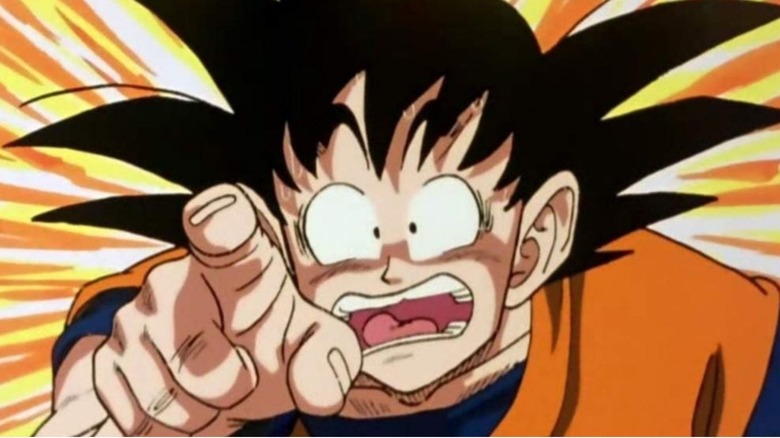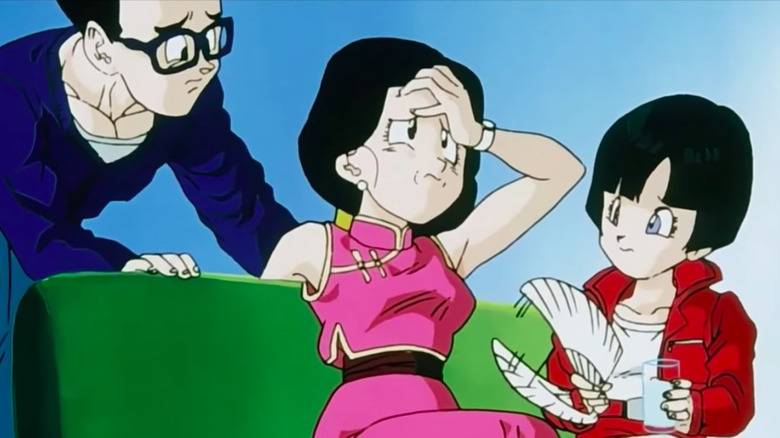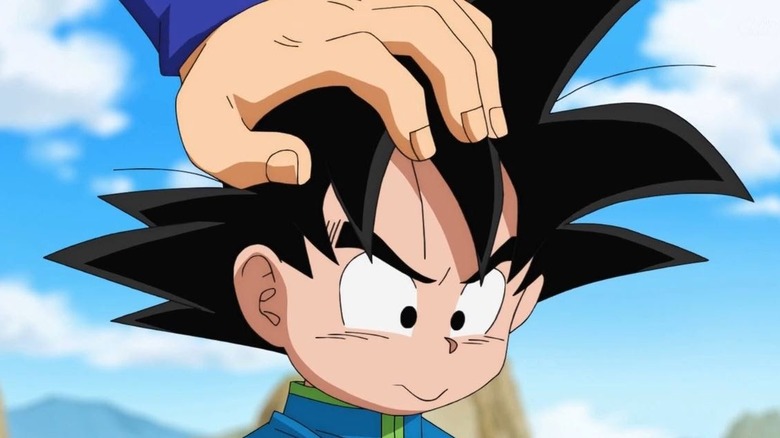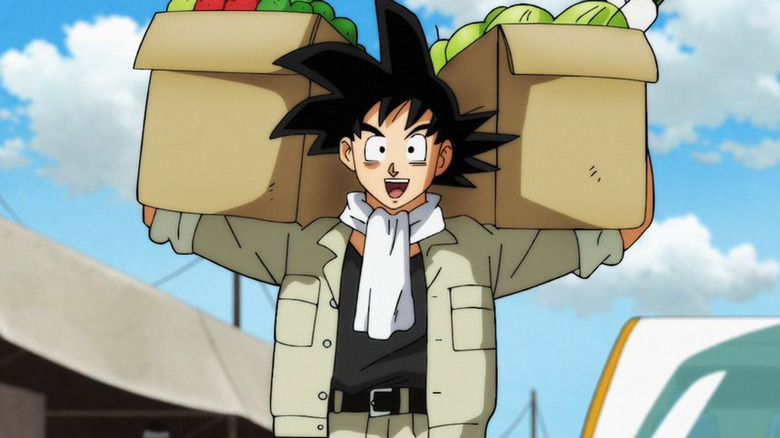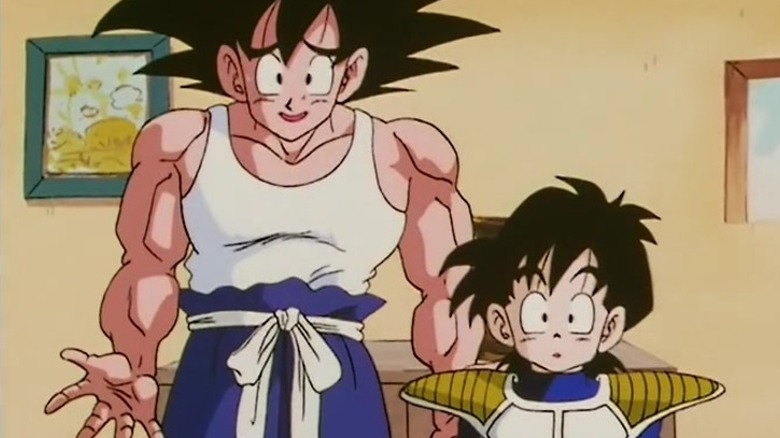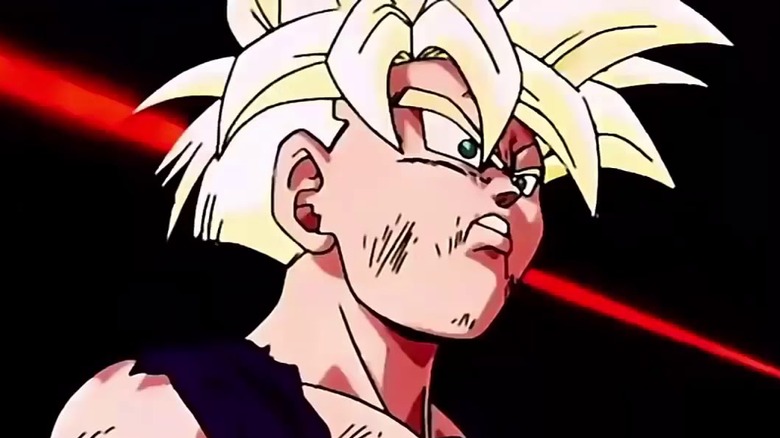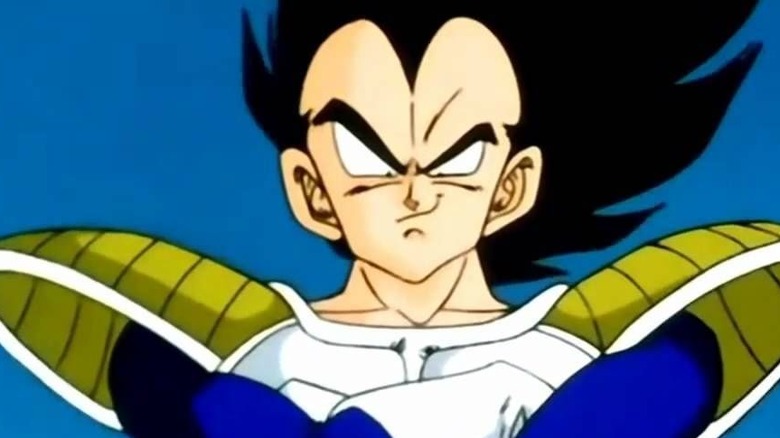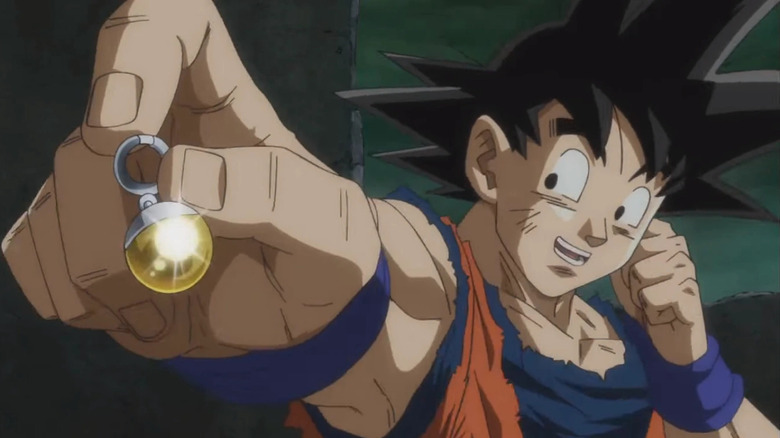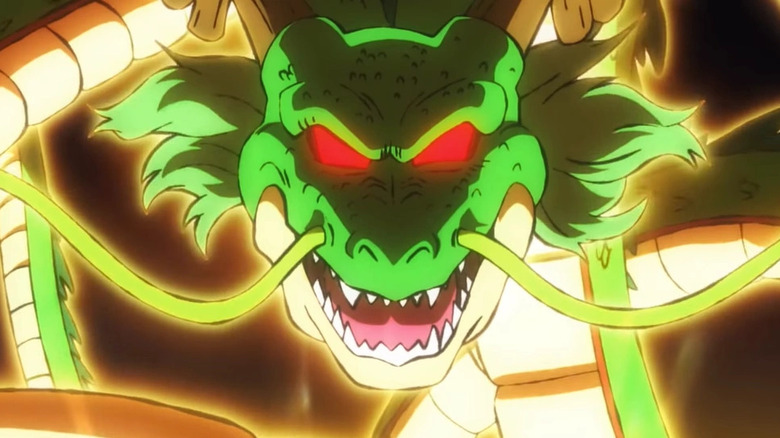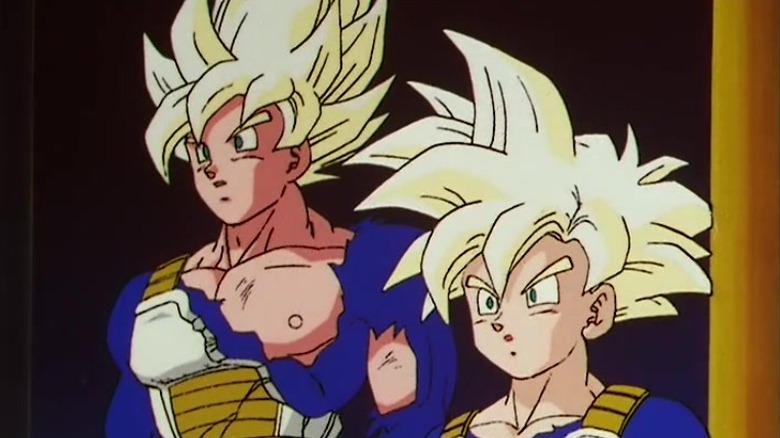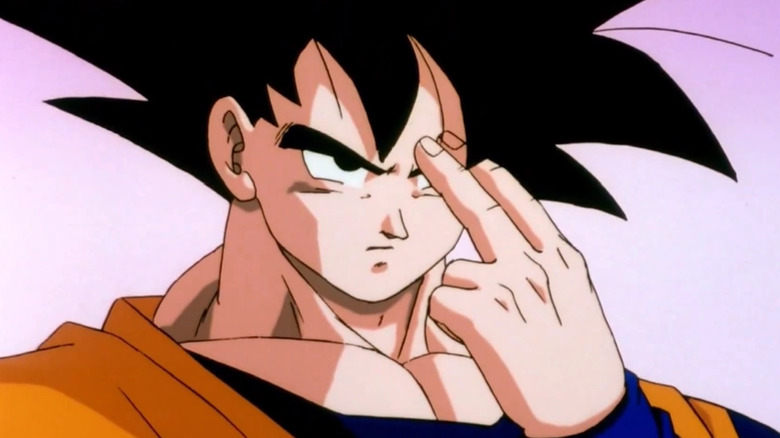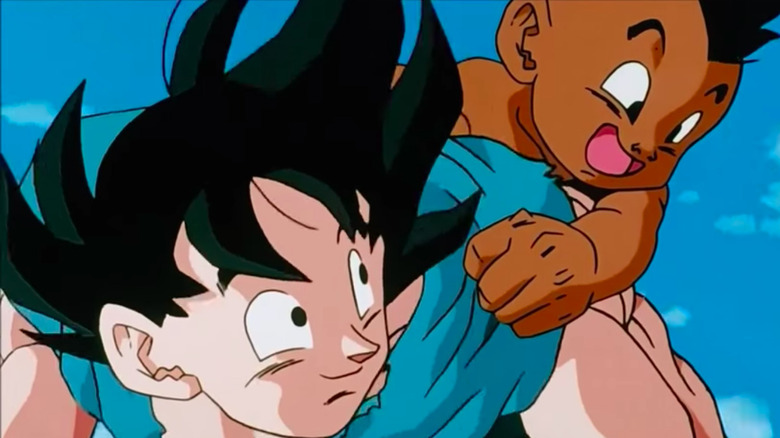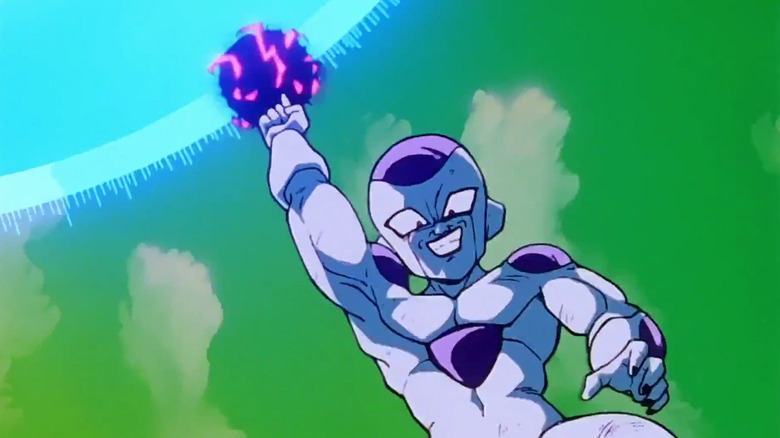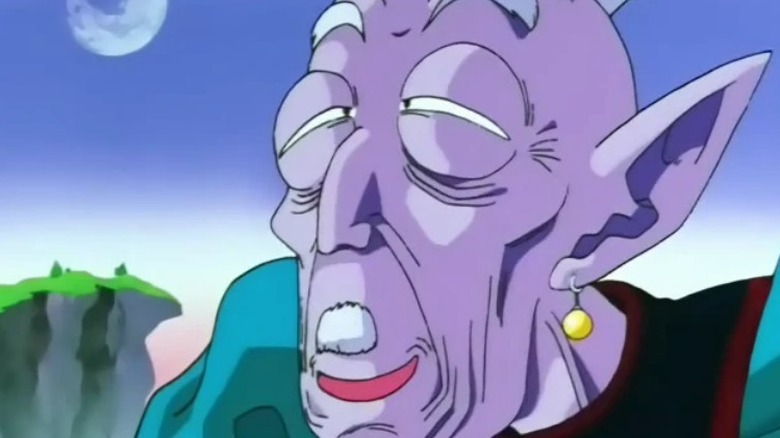Questionable Things About Goku In Dragon Ball Z
He's saved the Earth from threat after threat, stopped intergalactic menaces like Frieza and Majin Buu, and literally given countless people their lives back with help from the Dragon Balls, all while fulfilling his personal ambition to keep growing more powerful. There's no denying Son Goku, the star of the popular "Dragon Ball Z" anime — and the Dragon Ball series as a whole — is capable of great heroism.
Yet, for all his great achievements as a hero and a martial artist, that doesn't necessarily mean Goku's perfect. Even his creator, Akira Toriyama, doesn't view Goku as that benevolent, according to a 1997 Wired interview translated by Kanzenshuu. Pretty surprising for a warrior who's always been said to be pure of heart — until one starts taking a closer look at his actions. Just what are the things holding Goku back from being his best self, you ask? Take a break from training and sit back while we summon Shenron for answers.
He runs out on his family with little notice
Goku's often absent as a father in "Dragon Ball Z," although one can't entirely blame him, seeing as he's killed off twice. However, he could have handled his second demise a little better. When the heroes of Earth are trying to figure out how to bring him back after being killed by Cell, Goku tells them (thanks to King Kai's long-range telepathy) that he doesn't want to be resurrected, as he feels he's a magnet for trouble. While one could argue that Goku isn't necessarily wrong, he makes the big faux pas of only telling his friends and his son Gohan, leaving out his own wife, Chi-Chi.
When Goku parts ways with his family again at the end of the series to train Kid Buu's reincarnation, Uub, he doesn't give that much notice, either. This time, he actually gives Chi-Chi a heads-up before leaving — along with Gohan and the rest of his family — but it's so quick that they barely have time to react before Goku and Uub have left. Similarly, when Goku barely escapes the explosion of Planet Namek at the end of the Frieza Saga years earlier, he decides not to go home right away and stays training on Planet Yardrat. If it weren't for Porunga, then Gohan, Chi-Chi, and his friends would have spent months not knowing whether Goku was alive. To be fair, the technique he learned on Yardrat — the Instant Transmission — has proven to be indispensable.
He's not always the best father
Goku can be a very caring parent, but not always. When he dies fighting Cell, he doesn't make checking on his family a habit during the next seven years, despite being with King Kai, whose powers allow him to telepathically contact them on a regular basis. As a result, Goku's completely shocked to learn of his second son, Goten. Furthermore, while Goku's first meeting with Goten is very sweetly handled in the anime — which adds a dramatic embrace between the two — such a scene is absent from the manga, where Goku merely acknowledges he has another son and demonstrates no signs of affection. To be fair, that does change once they get to know each other, as seen when Goku hugs him before going back to Other World.
When it comes to his older son, Gohan, Goku is overall demonstrative in his affection toward him and proves to be a solid mentor when the two train in the Hyperbolic Time Chamber together. However, even their relationship isn't perfect, as Goku has shown he doesn't quite understand Gohan as well as his eldest son's other mentor, Piccolo. Furthermore, the anime adds a rather unfortunate scene by having Goku punch Gohan in the face to stop him from avenging Piccolo, whom Imperfect Cell has gravely wounded.
He's not a big provider
Goku may be among the most skilled martial artists in "Dragon Ball Z," but the one thing he's not so great at is getting a job. Instead, Goku tends to divide his time between fighting bad guys, training, and lounging around, meaning his family has to primarily rely on the money from Chi-Chi's wealthy father, the Ox-King, to make ends meet. At least Goku is sometimes seen getting dinner for his family — like when he catches fish — which he can do for free.
"Dragon Ball GT" humorously pokes fun at Goku's frequent joblessness by having him encounter an illusion of Chi-Chi (dressed as a nurse and holding one of Goku's greatest fears in the anime, a giant hospital syringe) that yells at him for never looking for paying work. It isn't until "Dragon Ball Super" that we see Goku doing actual work, namely harvesting crops that he and Chi-Chi can sell for money. It is odd, however, that Goku never thinks to make a living off martial arts by opening a school like Tien or participating in more paid fighting competitions than just the World Martial Arts Tournament (which he'd surely win 99% of the time, provided he remembers to hold back against normal humans).
He's at odds with Chi-Chi over Gohan and martial arts
Goku and Chi-Chi have a fairly major sticking point between them for much of the series: Gohan's future. Chi-Chi has no interest in her oldest son becoming a martial artist and hopes that he becomes a brilliant scholar and actually earns a living when he grows up. Yet once Gohan's massive potential is discovered, Chi-Chi's dreams for Gohan become at risk, as Piccolo and Goku begin training the powerful half-Saiyan in martial arts. Notably, Goku and Chi-Chi have a particularly strong disagreement over whether Gohan should prepare with Goku and Piccolo for the inevitable arrival of the Androids, but Chi-Chi eventually acquiesces under the condition Gohan abandon martial arts afterward. In the end, Goku's instinct that his son's power could help proves more than true when Gohan ends up being the one to defeat the most powerful Android, Cell. But Chi-Chi also gets what she wants, as Gohan quits fighting soon after and focuses on his studies full time.
He relies on his pacifist son to beat Cell
Goku may love his son, but he doesn't always understand him. After the two finish training so that they can stand up to Cell, Goku is completely relaxed, despite learning from Korin that Cell still exceeds his power. While he ends up doing much better against Cell than he probably expected, Goku forfeits the match, revealing his secret weapon: Gohan, who's surpassed him in strength. Goku is so confident in Gohan's victory that he even hands Cell a Senzu Bean to make it a "fair" fight.
While Goku's choice to restore Cell's health is questionable enough, he makes an even bigger miscalculation: he misjudges Gohan's willingness to fight. While Goku's son didn't have trouble jumping into fights in the past, the Cell Games make Gohan become more reflective, and he doesn't actually want to battle Cell. Or, more specifically, he doesn't want to kill him. As a result, Cell manages to give Gohan a significant beating while also hurting Gohan's friends with the Cell Juniors. To be fair, Gohan still wins thanks to a meaningful pep talk from Android 16, but had Goku been better at judging his son's character, he probably could have handled that situation a little more smoothly. Specifically, he could have at least let Gohan in on the plan beforehand, as Piccolo — who understands Gohan's inner nature better — points out.
He shows mercy, but not always wisely
While being merciful isn't necessarily a bad thing, one should be responsible about it. That's not quite the case with Goku, who dispenses mercy without always thinking things through. When he prevents Krillin from murdering Vegeta, for example, he also lets the Saiyan prince escape Earth. Sure, this paves the way for Vegeta's reform, but it also unwittingly leaves the door open for him to slaughter more innocents, as seen on Namek. Goku makes a similar mistake in "Dragon Ball Super" when fighting Moro, showing mercy to an enemy he thinks he's beaten without considering that the wizard may have an ace up his sleeve.
The person Goku's makes this mistake the most times with, however, is Frieza. When he's preparing to leave Namek, Goku gives Frieza a bit of his energy so the lizard-like tyrant can escape the planet — a mistake Frieza literally throws back at him by firing an energy blast while Goku's back is turned. Later, in "Dragon Ball Z: Resurrection 'F,'" Goku originally tells a losing Frieza to leave and come back when he's gotten stronger. Of course, he doesn't consider that Frieza might kill a whole lot of people before their next rematch or even grow too powerful for Goku to handle (thankfully, neither occurs). That's not to say Goku should have killed these villains (although, in some cases, he eventually does), but perhaps he could have asked his genius friend Bulma to create a special cell or device to neutralize their powers?
He places warrior pride and fairness over logic
Goku may be pure of heart, but he's still a Saiyan, meaning he has an innate desire to fight, like most members of his species. While he has at times placed the greater good over his desire for a fair and satisfying fight, he doesn't always, leading to some pretty dumb decisions. When fighting the ruthless Kid Buu, for example, both he and Vegeta decide not to fuse into Vegito again, forgoing a major strength boost so they can fight their relentless foe with their own strength. While their decision can be somewhat explained by the fact they believed back then that fusion via Potara earrings are permanent, their actual rationale is that they prefer to fight without borrowing another person's might. Goku uses the same rationale in the "Dragon Ball Super" manga when the Supreme Kai offers his Potara earrings to him to use against Fused Zamasu, but changes his mind when Vegeta — who has just learned the fusion's temporary — tells Goku to hand him one of the earrings.
Naturally, Gohan's decision to restore Cell's health with a Senzu Bean during the Cell Games also factors into this character flaw. Despite Goku believing in fairness, that probably shouldn't be a big consideration when your enemy has the power and intention to blow up your planet.
He never uses the Dragon Balls for lasting good
Sure, saving the world is an important job. Yet Goku generally tends to fight to return his adoptive planet to a status quo rather than to a better place. While not uncommon for action heroes, this is particularly noticeable in Goku's case, as he could easily make the world a better place by borrowing Bulma's Dragon Radar and wishing to, say, cure world hunger. Nevertheless, neither he nor his friends think to ask Shenron or the other dragons for such wishes, which is kind of a shame. However, it bears noting that such decisions could take them to the point where they rely on the Dragon Balls to solve all their problems, which is something Elder Kai cautions against in the series. The danger of this path is really hit home in "Dragon Ball GT," when all the accumulated negative energy from the wishes Goku and company have made with Earth's Dragon Balls causes several evil dragons to emerge.
He takes unnecessary risks
Even though you can sometimes understand Goku's train of thought with some of the decisions he makes, that doesn't necessarily mean they're the best ones. When first fighting Buu as a Super Saiyan 3, for example, Goku decides not to beat him, despite revealing that he probably could have. Goku's reason for not doing so, he explains, is because he wants to give the younger generation of fighters a chance to defeat Buu. This leads to complications, however, when Buu kills several more humans while waiting for the younger fighters to complete their training. While Goku and the gang count on the Dragon Balls as a means of bringing back Buu's victims, their reliance on the wish-granting orbs hits a major snag when Kid Buu blows up Earth, taking Earth's Dragon Balls with it. If Porunga — the eternal wish-granting dragon of Namek — had not gotten a huge power upgrade when Moori succeeded Guru, then there would have been no way to wish back Buu's benevolent victims en masse at the time.
Another major risk Goku takes is choosing to leave the Hyperbolic Time Chamber with Gohan before using up the maximum amount of time they have available. Had they instead trained for a full two days, perhaps Goku would have had the strength to defeat Cell himself and avoid putting his son in an uncomfortable position.
He doesn't teach all his techniques to others
Goku can be a pretty solid teacher. After all, he taught Goten and Trunks the Fusion Dance and Gohan the Kamehameha and Super Saiyan transformation, which is definitely impressive. Yet there are some techniques he seems to have kept for himself. For instance, at no point during the series does he seem to teach anyone his handy teleportation technique, the Instant Transmission (not even while he's training Gohan for a year). Furthermore, he seems to be the only one of King Kai's living Earth-based pupils who's mastered the Kaio-ken but doesn't teach the useful strength-boosting technique to his friends or children. To be fair, there are possible explanations for both, as the techniques are said to be quite a challenge to learn — particularly the Kaio-ken, which is both dangerous and beyond even the ability of its creator, King Kai, to use.
He's not as selfless as you might think
Akira Toriyama has said the "Dragon Ball Z" anime sometimes makes Goku too heroic, explaining to Wired that the show sometimes overlooks the "elements of 'poison'" he infuses the character with in the manga. Perhaps a chief example is Goku's recurring habit of doing supposedly "righteous" things for selfish reasons. When Goku abruptly flies out on his family to train Uub, for instance, his stated reason is to prepare the young man to become Earth's next defender. Yet as Vegeta points out, Goku's primary motive for training Uub is probably so they can one day battle. Similarly, Goku saves Vegeta's life in the Saiyan Saga and nearly lets Frieza go in "Resurrection 'F'" because he also craves future bouts with them. Additionally, Goku can be rather thoughtless: In the "Dragon Ball Super" Tournament of Power, for instance, he never considers asking Super Shenron to resurrect the universes erased during the battle royale, as Android 17 does.
How can Goku do these things and still be pure-hearted, you ask? As Toriyama tells legendary Goku voice performer Masako Nozawa in "The World of Akira Toriyama: Special Exhibit" (via Kanzenshuu), Goku actually has "a very pure sincerity about 'wanting to become stronger'" rather than a heart that's pure due to kindness. At least he has a solid history of defending his friends, going all the way back to "Dragon Ball," where he performed kind deeds like resurrecting Upa's dad, Bora.
He relies a whole lot on luck
There's no denying Goku is one of the most powerful and skilled martial artists in the universe, with a unique charisma that has turned many former enemies and rivals into his friends. Yet, for all his skill and informal charm, his luck is undoubtedly one of his greatest assets. How else would you explain how he's able to form a gigantic Spirit Bomb without Frieza killing him or noticing until it's almost complete? Plus, as mentioned earlier, Goku learns about Porunga's new ability to bring back many people at once (rather than one person at a time) right when he needs it most.
Goku's good fortune also compensates for a lot of his shortcomings and mistakes. His near-complete inability to be formal towards deities, however, turns out to be utterly refreshing to the Omni-King in "Dragon Ball Super," who accepts Goku right away rather than considering his informality a sign of disrespect. That same luck also saves Universe 7 from losing Beerus' martial arts tournament against Champa, as Goku's forfeit would have doomed his team to defeat if Hit had not thrown the next match against the vastly weaker Monaka. Finally, luck rewards Goku again when he promises to give Omni-King a friend to play with. Despite having no idea who it would be, the answer literally comes to him (or, more accurately, he summons it) in the form of Universe 6's Omni-King.
He's not a fan of easy power-ups
When he's a kid in "Dragon Ball," Goku doesn't seem to have a problem getting power increases handed to him when he needs it, such as when he drinks the Ultra Divine Water to become strong enough to challenge Demon King Piccolo. When he reaches adulthood and enters the "Dragon Ball Z" years, however, he believes that he should reach new strength levels on his own. This is particularly notable in "Dragon Ball Z: Battle of Gods," where Goku does accept help when first becoming Super Saiyan God, but with some regret, as he would have preferred to have accessed the form without assistance.
On one hand, this attitude can be an asset, as it encourages Goku to train harder. For example, it's how he learns to transform into a Super Saiyan God on his own and how he discovers Super Saiyan Blue. Yet it also prevents him from becoming as strong as he could be. He's yet to have Old Kai awaken his inner potential, for instance, as the deity does for Gohan in the Buu Saga. This is not a problem if Goku has the luxury to get stronger at his own pace, but when new and more powerful threats appear on a regular basis, it's something he arguably can't always afford.
